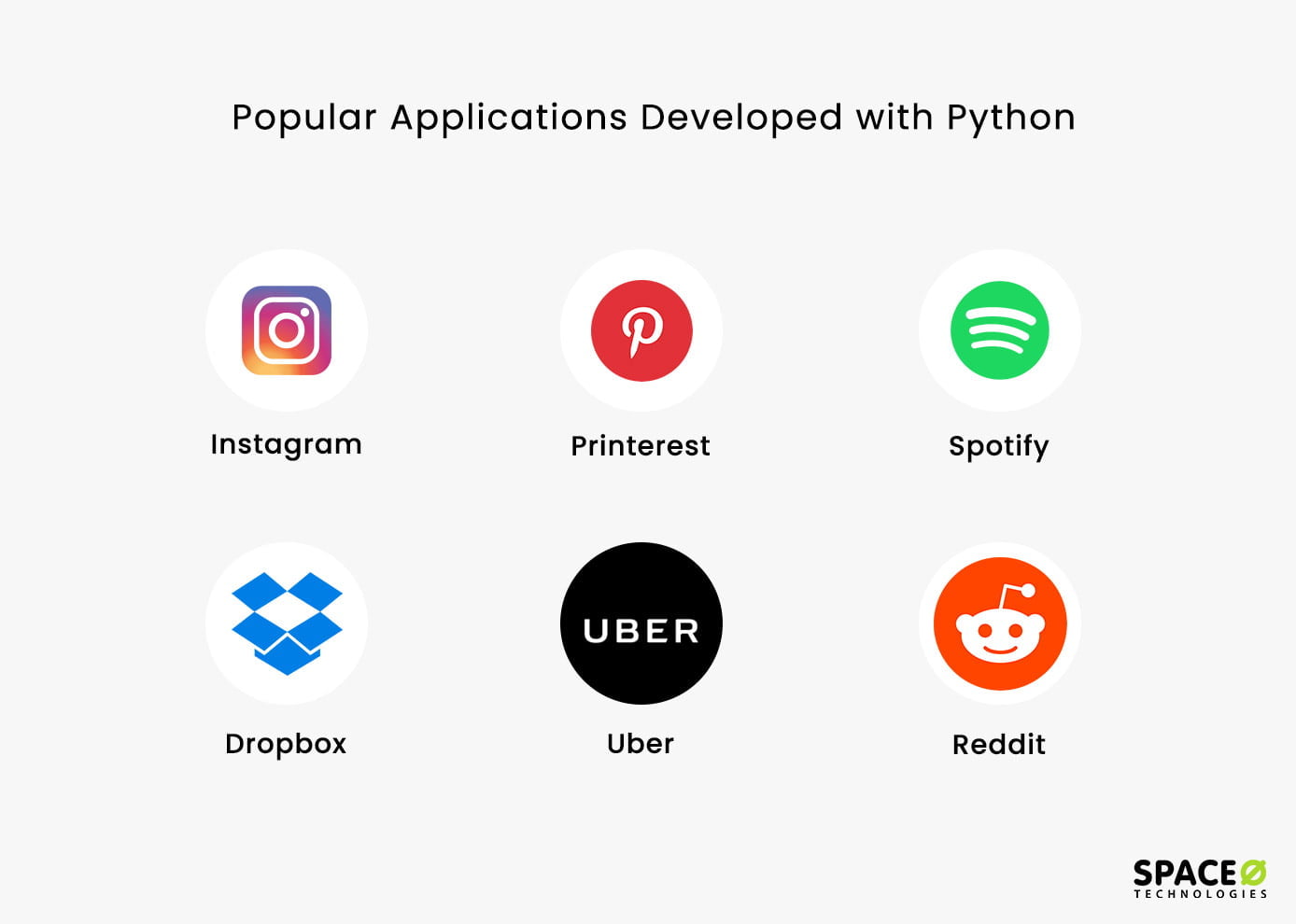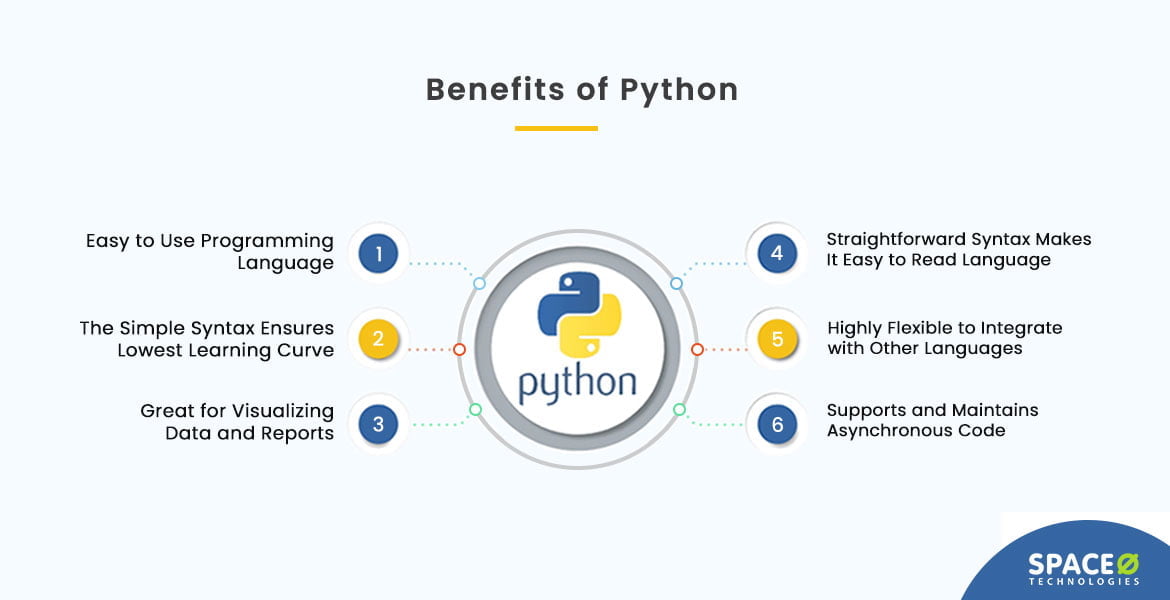Python is among the most-used programming languages and has a strong developer base. 48% of developers use Python to develop a solid, robust backend for applications.
It is preferred owing to the ease of readability, simplicity, and many free Python libraries that makes the developer productive and efficient.
With extensive third-party integration capabilities, Python app development enables faster digital transformation for your business.
Many developers are using Python to make their mobile apps robust and reliable. However, the question comes to why use Python for mobile app development.
Being a top mobile app development company, let’s help you to answer this question in detail. In this guide, you will about whether Python is suitable and the reason to build a mobile app using Python.
Table of Contents
- Can Python be Used for App Development?
- How to Develop a Mobile App using Python in 5 Steps
- Which are the Top Mobile Apps Built with Python?
- Difference Between Python and Native App Development
- Why Choose Python for Mobile App Development?
- When to Choose Python for App Development?
- Pros and Cons of App Development with Python
- Top Python Tools for App Development
- FAQ About Python Mobile App Development
- Want to Develop Powerful Apps with Python?
Is Python Good for Mobile App Development?
Python is an interpreter language, which isn’t supported by either Android or iOS. So, does that mean you cannot use it for Python Android app development or iOS app development? No, you will need to translate the app code before deploying it natively.
Knowing how easy it is to develop and run code on Python, the company developed different GUI frameworks that bridge the original Python object-oriented web framework and the native application requirements. In short, it helps to provide interaction between the Python and Android APIs. Owing to these translator bridges, the code is read by the native app systems.
Here are the points you require to look into when developing a mobile app for cross-platform support with Python native code.
| Operating Systems | Things to Consider |
|---|---|
| Android |
|
| iOS |
|
You have understood whether Python is suitable for mobile app development or not. Next, learn how to develop a mobile app using Python.
Looking for Python App Development Services?
Talk to us. Share your mobile app requirement with our Python app development consultant and convert your idea into a live mobile app

How to Develop a Mobile App using Python in 5 Steps
Developing mobile apps using Python seems daunting at first. However, by following the right steps, it will be easier for you to turn your idea into a live app.
Plan the Pre-requisites
Based on your requirements and ultimate app goal, define the prerequisites for developing the app. You should know some of the technologies within the tech stack you need to implement and the infrastructure for app development.
You need a device that is compatible with Python. It would help if you also had a mobile phone (Android-based or iOS based) to help test the infrastructure.
Create the simulation environment for Python mobile development. You should also create a project folder to develop mobile apps using object-oriented Python programs.Prototyping and Wireframing
Creating user movement and interaction with the app interface is an essential step for Python developers. It is easy to devise a mobile app prototype with Python, as it is built for creating simple and effective designs.
Once you have designed the experience strategy and determined how the app will move from here, you should begin devising the prototype.
This will help realize how the software solution will flow, the different screens, and plan the navigation. You can use the custom UI toolkit to get started with the design for Python language.Coding with Python
Start working on the backend code for the software development using Python’s web-based automation tool. You should develop the mobile solution using the interpreter language and ensure a smooth flow of components between the graphical user interface and the server side of the application. Also, if you are developing an image processing app, you can use libraries such as PyTesseract for Python Imaging Library for object detection as well.
Selecting the Framework
As discussed earlier, you will need a GUI Python framework to translate the code to native modules. You will select Kivy for iOS and Beeware for developing using Android. It is an essential step as going forward, you will develop the application for the particular framework.
Once you have installed the package for the framework, you will run the code you have built on the framework.
Launch the Application
As Python allows for a test-driven application environment, you will continuously test the modules. Once tested and optimized, it is time to launch the application to the respective app stores.
We have discussed step-by-step methods to build a mobile app using Python. Next, we will check the top mobile apps written in Python.
Which are the Top Mobile Apps Built with Python?

Here’s a list of all the top app development brands that used the different Python frameworks. A list of apps written in Python.
Difference Between Python and Native App Development
While developing mobile apps, understand the mobile app development process. Also, you need to know why to choose Python over the native language Swift. Here are some differences between Python and Swift that can help you understand better.
| Why Choose Swift for App Development? | Why Choose Python for App Development? |
|---|---|
| General purpose, object-oriented, and multi-paradigm language | High-level interpreter language used for general purpose |
| Swift is used for macOS, tvOS, and iOS devices | Python is used for web, DevOps and now mobile app development for multiple platforms |
| App size is bigger in Swift as the programming language tends to use different components for varied needs | The app size is comparatively lower with Python as it believes in reusability |
We have discussed the differences between Swift and Python, next learn how Kotlin features differ from Python.
| Kotlin | Python |
|---|---|
| Statistically typed object-oriented programming language that uses FP paradigm | High-level interpreter language used for general purpose |
| Completely compatible with Java libraries and doesn’t need you to write long lines of code | You will need to write long lines of code and need a virtual Java machine for translation |
Having considered the fundamental difference between Python and Swift, let’s take a look at the difference between Python and Swift
Code Readability
Python is a winner here as it was built to make reading codes easy. On the other hand, Swift can complicate the development by using different codes for different resolutions.
If you want to simplify the coding for complex applications, Python could be your go-to programming language
Developer Strength
Regarding Python, numerous developers are waiting to help with application development. The developer strength isn’t as much for Kotlin or Swift, which makes the programming language better for Python mobile development. On the contrary, you will find an experienced Python developer who easily develops apps.
Cross-platform Development
If you are a startup, you would want to simultaneously release the mobile app for both platforms. However, utilizing the same resource for cross-platform Python framework with native apps is impossible. You can do that with Python. Hence, Python is a seemingly incredible platform for this purpose. As a result, whether you want to develop business apps or audio and video apps, you should use Python’s cross-platform GUI toolkit.
Size of Apps
As Python works with the reusability premise, you can use the components across mobile app development. That’s not the case with Swift, at least. As a result, iOS apps are more significant compared to Python apps. Moreover, Python is better than Java when it comes to memory management.
Cost-efficient
You save a lot of money on infrastructure and developers when you develop Python mobile apps with Python. You can use the same team to deploy apps for iOS and Android. However, with the native approach, you will need two different teams to manage the development for iOS and Android.
Better Testing and Development Infrastructure
The programming language offers its testing and development framework. It increases the speed of development and testing with the test-driven development environment. With Python, you can quickly test, develop, and launch applications faster than native apps.
Big Data Support
If you are planning heavy data-driven applications, Python can be better than other programming languages. It is built to support data languages, offers extensive analytical, insight-building capabilities, and supports different machine learning platforms. As a result, it is easier to develop machine learning apps for different platforms for mobile device.
Third-party Support
As against native approaches (both Android and iOS), Python is highly operable with third-party modules and plugins. You can extend the capability of your mobile app to make an app with Python using the open-source Python library.
You should have clear understanding of API development with Python to develop such command line apps or business management apps.
Why Choose Python for Mobile App Development? [6 Benefits]

We have seen the difference between Python for cross-platform and native application development approaches. Here, we will take you through the top benefits of choosing Python over other approaches. These benefits will help you decide how to proceed with Python for mobile app development.
Excellent Readability
As a developer, when you sit to read or work on other developers’ code, it can get difficult. You need to comprehend the code, identify it, and then work on the new feature. However, with Python’s easy-to-read code, you won’t face difficulty testing the code, redesigning the app, or developing a new feature.
The best programming language combines dynamic typing and binding, which makes the entire code simple and readable. As a result, whether you are updating the code or redesigning it, you can efficiently work without complicating the code.
High-level Security
When it comes to mobile apps, you cannot have security lapses. This is specifically true with apps that enjoy customer data or highly secure data. Keeping it safe can be a phenomenal task for the developer.
However, the inherent security abilities and layers in Python programming language and the encryption it offers enable developers to improve the app’s security. The programming language is highly tolerant of cyber attacks and other vulnerabilities. As a result, your data remains safe with this language.
Modular Development Approach
Python has been graded for its modularity, which makes achieving milestones within the stipulated time easy. It becomes easier when you divide the entire application into modules and develop them individually. You can divide the different app development tasks among the developers, thus making it easier to produce the end product.
With this modular approach, a single person would not be working on the app development, which means high productivity and efficiency.
Exceptional Response-time
When you are fixing bugs, it can take up the efficiency of your entire team. As a result, it will slow down the mobile app development process. However, that is not the case with Python. The interpreter in this programming language spots the errors immediately and reports them on time. as a result, the developer can fix them immediately and resolve the issues. Eventually, it will improve the developer’s productivity.
Effective Libraries
The various Python libraries can help you get started with developing apps for the mobile market. You don’t need to build the code from scratch for the entire application. You can easily fix some parts with the best Android libraries and the extensive coding already available, which makes it easier for the developer.
Integrates with Ease
One of the most significant advantages of working with Python is its easy integration. It can easily fit into your existing Python applications and even work with the systems. As a result, it is pretty easy to extend the system’s capabilities and modernize your enterprise without much effort.
When to Choose Python For Mobile App Development?
This programming language is highly suitable for developing the following solutions.
- Cryptocurrency solutions
- Algorithmic trading systems
- Mobile banking app development
- Finance analytics tools that operate on large datasets
Looking to Develop Custom Mobile App?
Our team of Python developers has built solutions such as Glovo, One8, and TOR VPN App and help you build your app according to your requirement.
Pros and Cons of App Development with Python
Weighing up the pros and cons can always help you to make a decision. Therefore, we have shared a list of some pros and cons. Consider reading the mentioned pros and cons to know more about Python. Let’s get started with each one of them!
| Advantages of Using Python for App Development | Limitations of Using Python for App Development |
|---|---|
|
|
Top Python Tools for App Development
For building Python apps, you will also need the best tools that make your Python application development task easy. Fortunately, it offers various tools for mobile development and web development. So, let’s check out the top tools based on their reviews and features. This table will help you to find out which tool is the best in terms of features, reviews, and ratings.
| Website | Reviews(G2) | Features |
|---|---|---|
|
| 4.5 136 Reviews |
|
 Kivy Kivy | 4.0 21 Reviews |
|
 BeeWare BeeWare | – |
|
 Bottle Bottle | 4.0 13 Reviews |
|
 Flask Flask | 4.5 37 Reviews |
|
 Pyramid Pyramid | 4.0 17 Reviews |
|
 CherryPy CherryPy | 3.0 12 Reviews |
|
Python is also utlised for the majority of web development. Here are the top companies that use Python for their website.
- Spotify
- Netflix
- Uber
You have learned the procedure to develop a mobile app using Python, examples of the app developed in Python. However, if you still have questions regarding Python for mobile app development, the following FAQs section to know the answers.
Want to Make an App like Uber or Spotify?
Get your free consultation from our Python app experts.
FAQ About Python Mobile App Development
Should I choose Python or Kotlin for app development?
Both Python and Kotlin are backend languages and support mobile app development. However, Kotlin has an upper hand compared to Python as it is developed by Google. It is swifter and more effective with better support. It offers greater safety features for smooth backend development.
What framework should you choose to build apps using Python?
Here is the list of the best framework for you to choose to develop apps using Python.
- PyQT
- Beeware
- Kivy framework
- Tkinter
- WxPython
Can Python programming language be a good choice for enterprise apps?
Yes, Python is a widely utilized programming language and is perfect to develop enterprise-level app development. Even, Python’s popularity is gaining traction and supersedes its peers including PHP, CSS, and JavaScript.
What are the key features of Python?
Here are the top features of Python.
| Features of Python | Description |
|---|---|
| Free and Open Source | Having been built under an OSI-approved open source license, Python is free to use for commercial purposes as well. Python can be easily downloaded from its official website for free. |
| Easy to Code | Python is easy to learn, as well as mastering the advanced concepts such as packages, and the module is difficult to understand. But, it is easy compared to other popular languages such as Java, C, and C++. |
| Robust Standard Library | Python consists of vast libraries such as image manipulation, databases, unit testing, expression, etc. Even, Python contains a growing collection of components that are available in the Python Package Index. |
Should I choose Python or Kotlin for app development?
If you are looking to develop complex apps integrating AI and ML technologies then Python is the best option for you. On the hand hand, if you are planning to develop lightweight and faster mobile apps moderate size then Kotlin can also be the best option for you.
Develop Powerful Apps with Python
In this guide, we saw that Python is one of the most favored programming languages for mobile app development. As part of this article, we took you through why you can use this high-end language for mobile apps. At the same time, you saw the process to follow to devise the apt mobile app using Python. This article also helped me understand why Python GUI frameworks such as Kivy and Beeware are important for Python development.
As developing mobile apps using Python is in its nascent stage, you will need to follow standard Python development practices to ensure smooth development and deployment.
Space-O Technologies is a competent mobile app development company. We have the resources and infrastructure to develop a strong backend for mobile apps using Python. Having built more than 4400 mobile apps, we stand strong in building mobile apps using advanced features.
If you are planning to build a mobile app solution for your business, connect with our experienced app development consultant right away.




